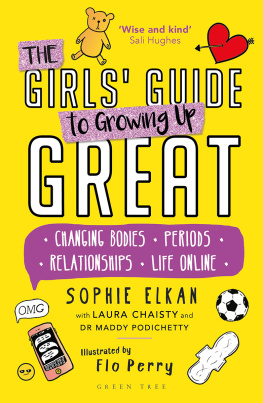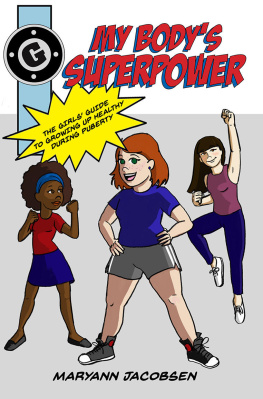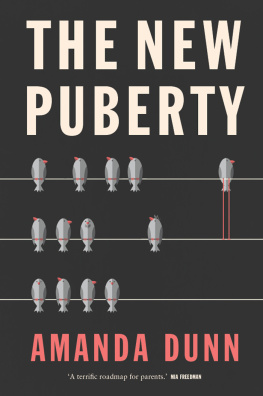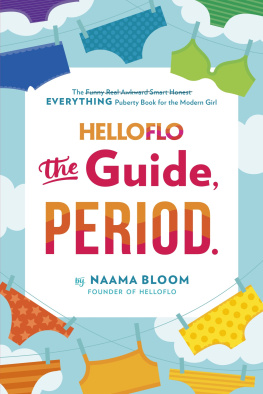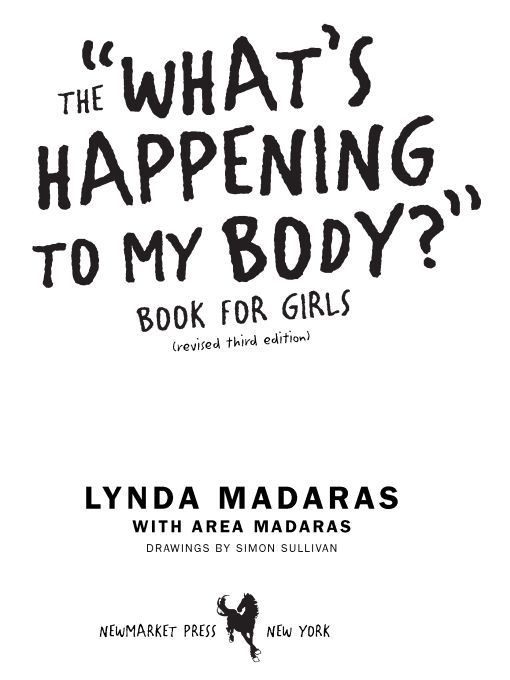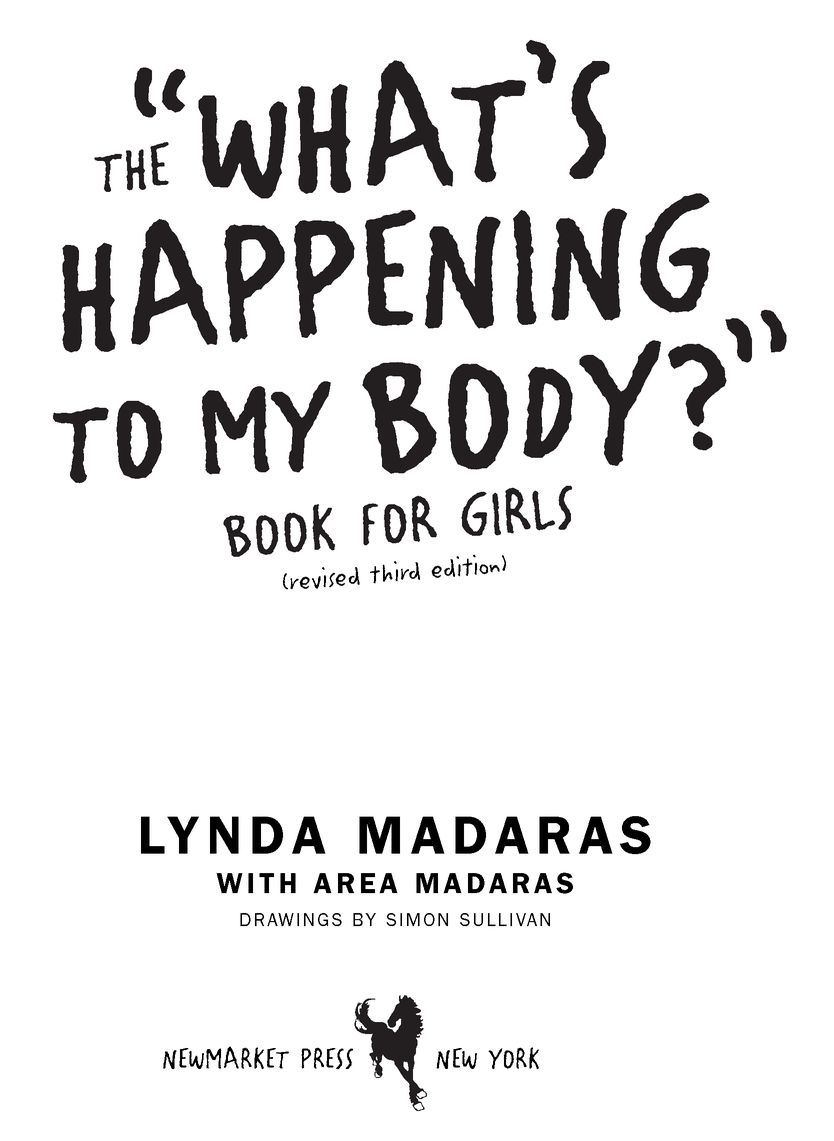Table of Contents
On Your Mark, Get Set, Grow! A WHATS HAPPENING TO MY BODY? BOOK FOR YOUNGER BOYS
Ready, Set, Grow! A WHATS HAPPENING TO MY BODY? BOOK FOR YOUNGER GIRLS
My Body, My Self for Girls AND AREA MADARAS
My Body, My Self for Boys AND AREA MADARAS
My Feelings, My Self for Girls AND AREA MADARAS
The Whats Happening to My Body? Book for Boys WITH AREA MADARAS
Lynda Madaras Talks to Teens About AIDS: An Essential Guide for Parents, Teachers, and Young People
Womancare: A Gynecological Guide to Your Body WITH JANE PATTERSON, M.D.
Woman Doctor: The Education of Jane Patterson, M.D. WITH JANE PATTERSON, M.D.
Great Expectations WITH LEIGH ADAMS
The Alphabet Connection WITH PAM PALEWICZ-ROUSSEAU
Childs Play
IN MEMORY OF YVONNE PINTO, 19681999
by Marcia E. Herman-Giddens, PA, DrPH
Puberty is an exciting but difficult and complex time, not only for the youngsters going through it, but for their parents as well. Lynda Madarass book The Whats Happening to My Body? Book for Girls presents thorough, open, child-friendly information on everything having to do with puberty, from the physical aspects of biological events and how to select the appropriate menstrual protection product to social issues such as sexual abuse and anorexia. It not only tells girls what they need to know, but will serve as a communication tool between themselves and their parents. Even though our culture surrounds us with sexual images, even sexualizing young children to sell products, we are still often conflicted and uncomfortable when it comes to discussing puberty and sexuality with our own children, especially now that girls are starting to develop at younger ages than in the past.
Parents will also benefit from reading the book, especially the Introduction, where they will learn ways to discuss puberty with their children. The book is so thorough, many parents will learn much themselves. Girls will especially appreciate the down-to-earth straight talk and the demystification of male and female sexual growth and functions. The questions from real girls in each chapter help make the answers personal for each reader.
This book is especially welcome given the confusing messages about sexuality from our culture and the increased prevalence and danger of the newer sexually transmitted diseases, both occurring at a time when many schools are more resistant to sex education than ever. In addition, access to accurate information is paramount for young people today because social protections that existed for children in the past have largely disappeared.
Instead of the envelope of shame and secrecy that has often accompanied female sexual growth and functions, this book celebrates the attainment of womanhood and promotes the idea of each girl designing a puberty rite to celebrate her entrance into womanhood. Wonderful! I hope this becomes a practice everywhere. Every girl and her parents will benefit from this remarkable book.
MARCIA E. HERMAN-GIDDENS, PA, DrPH
Adjunct Associate Professor of Maternal and Child Health
School of Public Health
University of North Carolina, Chapel Hill
My daughter must have been nine or ten when it first startedher introduction to the nasty world of playground politics and the cruel games young girls play with one another. Shed arrive home from school in tears; her former best friend was now someone elses closest ally; shed been excluded from the upcoming slumber party or was the victim of some other calculated schoolgirl snub. Shed cry her eyes out. I didnt know what to say.
It went on for months and months. And then I finally began to realize that no sooner had she dried her tears than I would hear her on the telephone, maliciously gossiping about some other little girl, a former friend, and cementing a new friendship by plotting to exclude this other girl. I was indignant, and I began to point out the inconsistency in her behavior.
You dont understand, shed yell, stomping off to her bedroom and slamming the door.
She was right. I didnt understand. From time to time, Id talk to the other mothers. It was the same with all of us. Why were our daughters acting like this? None of us had any answers.
Well, girls will be girls, sighed one mother philosophically. They all do it and we did the same when we were their age.
The games we played with each other were not very pretty. Exclusion was the basic format. One girl, for the crime of being the smartest, the prettiest, the ugliest, the dumbest, the most sexually developed, or whatever, was designated the victim. She was cast out, ostracized by the group.
On top of this, there was a growing tension between my daughter and me. She was terribly moody, and it seemed as if she was always angry with me. And I was often angry with her. Of course, wed always quarreled, but now the quarrels were almost constant. All of this bothered me a great deal, but even more disturbing was the change in her attitude about her body. In contrast to the shy wonder that greeted her first pubic hairs, there was now a complete horror at the idea of developing breasts and having her first period. Like most modern mothers, I wanted my daughters transition from childhood to womanhood to be a comfortable, even joyous, time. I had intended to provide her with all the necessary information in a frank, straightforward manner. But here was my daughter telling me she didnt want to grow breasts or have her first period. I asked why, but didnt get much further than because I donwanna.
Clearly something was amiss. I thought Id made all the necessary information available in the most thoroughly modern manner, but the anticipated resultsa healthy and positive attitude toward her bodyhad not materialized.
Finally I began to realize that I hadnt given my daughter all the information I thought I had. I hadnt told her very much about menstruation and the changes that would take place in her body over the next few years. Shed seen me in the bathroom changing a tampon, and Id tossed off a quick explanation of menstrual periods, but Id never really sat down and discussed the topic with her. Id read her any number of marvelous childrens books that explain conception, birth, and sexuality, but Id never read her one about menstruation. Obviously, it was time to do that.
Throughout history, in culture after culture, menstruation has been a taboo subject. The taboo has taken many forms: One must not eat the food cooked by a menstruating woman; touch objects she has touched; look into her eyes; have sex with her. We no longer believe in these superstitions, but the menstrual taboo is still alive and well.
Of course, we are no longer banished to menstrual huts each month, as were our ancestral mothers in more primitive societies. But, thanks to centuries of conditioning, we have so completely internalized the menstrual taboo that its simply not necessary to bother any longer with menstrual huts. We remove any disturbing sight or mention of menstruation through our ladylike avoidance of any public discussion of the topic and our meticulous toilet-paper mummification of our bloodied pads and tampons. So total is our silence that we ourselves are sometimes not aware of it.


